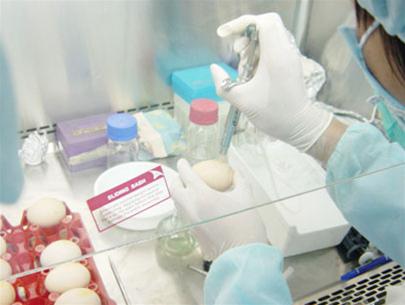Following the success of the Central Institute of Hygiene and Epidemiology in researching and producing the H5N1 flu vaccine using monkey kidney cell culture technology, scientists from three research and production agencies in Vietnam have jointly announced the creation of the first batches of vaccines for H5N1 influenza for both humans and poultry using hen embryo egg culture technology.
 |
| Vaccination production into hen embryo eggs at the Biotechnology Institute (Photo: TTO) |
The products are from the Vaccine and Biological Products Institute in Nha Trang, Hoai Duc Veterinary Medicine Enterprise in Ha Tay (Central Veterinary Institute), and Central Veterinary Medicine Company (Navetco) in Ho Chi Minh City.
This success, along with the achievements of the Central Institute of Hygiene and Epidemiology, reinforces the belief that Vietnam can fully ensure its vaccine supply in the event of an H5N1 pandemic.
Associate Professor Dr. Dinh Duy Khang, head of the Molecular Microbiology Department at the Biotechnology Institute, stated that since 2005, after learning about the World Health Organization (WHO) recommendations for countries to research and produce their own H5N1 flu vaccine, Associate Professor Dr. Le Tran Binh, the director of the Biotechnology Institute, proactively contacted WHO to request the transfer of the strain for vaccine production research.
After signing a memorandum of understanding, the Biotechnology Institute received the strain for vaccine production research (strain NIBRG-14) through the National Institute for Biological Standards and Control in the United Kingdom (NIBSC).
Mr. Khang mentioned that after receiving the strain, the Biotechnology Institute researched and produced batches of strains to supply to vaccine production facilities.
The estimated price of domestically produced H5N1 vaccines is lower than that of imported vaccines. However, the most important aspect is that Vietnam can proactively manage its vaccine supply when outbreaks occur, avoiding situations of vaccine shortages or the need to import large quantities of vaccines in a short timeframe that exceed the capacity of domestic vaccine quality assessment facilities.
KHIÉT HƯNG

















































